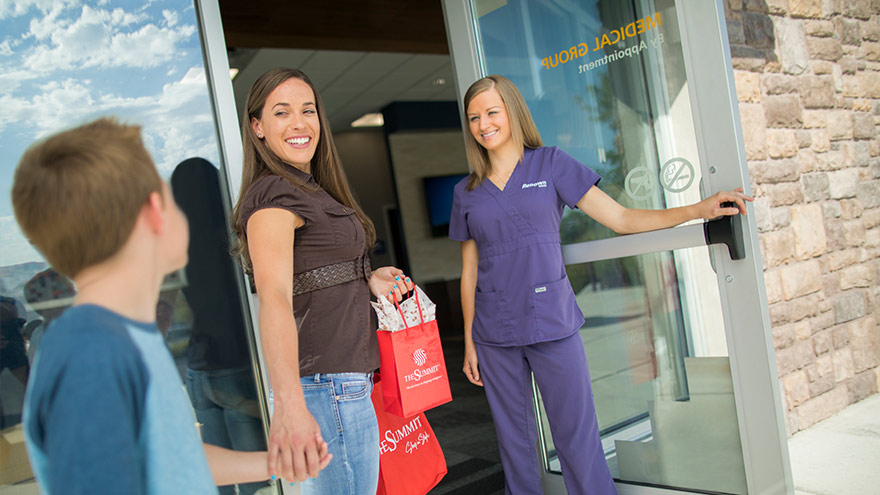Buscar
-
3 Unexpected Perks of Choosing a Hometown Health Plan
Becoming a Hometown Health plan member opens you up to the largest provider network in our region. As northern Nevada’s only not-for-profit health insurance company, the hometown advantage goes beyond your health coverage – and you may not be using all the perks available to you. Here are three benefits that Hometown Health is proud to offer all members to enhance wellbeing and connect the dots between healthcare and technology. MyChart MyChart is Renown Health's and Hometown Health’s secure online member portal that gives you direct access to your health and benefit information. From 24/7 access to your benefits and important documents to scheduling an appointment with your provider, this free tool is a great way to keep track of your family’s health. If you have a Renown primary care provider, you can use MyChart to: Securely email your healthcare provider. Get your test results faster and view your After Visit Summaries. Request prescription refills. Schedule and check-in for appointments. Pay your bill. Request your medical records and review immunization records. Manage designated health care agents and upload end-of-life documents, such as advance directives and a living will. View or download your documents: Member ID Card, Summary of Care, Explanation of Benefits, Referrals and Authorizations. Get in touch with our Customer Engagement Center. Telehealth Virtual visits have never been easier thanks to Renown Telehealth and Teladoc. These two tools are convenient options that allow members to be seen by a qualified doctor via phone or video chat who can diagnose, recommend treatment and prescribe medication for many non-emergent medical conditions – no matter where you are. Some of the health issues your virtual provider can treat include: Cold and flu Allergies Sore throat Sinus infection Respiratory infection Stomach bug Ear infection Urinary tract infection Both Renown Telehealth and Teladoc are also staffed with specialists in behavioral health, where you can speak with a therapist or psychiatrist on a wide variety of issues, including: Stress and anxiety Depression Trauma Grief Burnout Medication management Renown is also proud to offer access to top-level specialty care to address your ongoing condition and help guide you through illness maintenance and education. Through Renown Telehealth, Hometown Health members have access to a variety of specialties, including (but not limited to): Adolescent Medicine Cardiology Hematology, Oncology and Pediatric Oncology Nephrology Pediatric Endocrinology Pediatric Neurology Pulmonary and Pediatric Pulmonary Sleep Medicine New in recent years, Teladoc is now proud to offer both dermatology and nutrition visits. Teladoc dermatologists can treat conditions like acne, rosacea and rashes, while their registered dieticians can help you manage your nutrition and weight goals. Booking an appointment with Renown Telehealth is easy by heading over to MyChart and selecting “Schedule an Appointment.” To book an appointment with a Teladoc provider, visit teladoc.com or download the Teladoc app. Renown Telehealth is available within the state of Nevada, and Teladoc is available in all 50 states. Your copay can be as low as $0 for each visit; check your plan documents for more information. Doctoroo The house call has returned – avoid long urgent care waits with Doctoroo. Through Doctoroo, Hometown Health members have access to in-home urgent care services at the same price as your regular urgent care copay. A call to Doctoroo will dispatch a fully equipped medical team consisting of an EMT and either a nurse practitioner or physician assistant to your home within a few hours. Whether you need treatment or testing, each team is ready to provide care in the comfort of your own home with their over 60 medications and antibiotics, EKGs, wound dressings, IVs, catheters and more. Doctoroo care teams can address and treat many non-emergent care areas and conditions, including (but not limited to): Respiratory Ear, Nose, Throat Eye Wound Care Cardiac Care Musculoskeletal Gastroenterology Doctoroo is open year-round from 7 a.m. to midnight. Book a house call in minutes in the Doctoroo app or by calling (888) 888-9930.
Read More About 3 Unexpected Perks of Choosing a Hometown Health Plan
-
Questions to Ask Your Neurologist at Your First Appointment
When it comes to your neurological health, seeking the expertise of a specialist is crucial. The Renown Institute for Neurosciences provides comprehensive care for complex diseases affecting brain, spinal cord and peripheral nerves. Let us help guide you through the appointment process to ensure a productive and informative first appointment. What to Expect at Your First Appointment at the Renown Institute for Neurosciences Duration and Purpose: Your first appointment will last approximately one hour. This time allows the doctor to ask specific questions, do a thorough neurological exam and discuss your concerns. Specialized Care: You will be matched with a provider who specializes in assessing and treating your specific ailment or condition. This tailored approach ensures that you receive care from an expert who has the specialized interest and expertise to address your needs effectively. Initial Assessment: During your visit, you will first see a medical assistant who reviews your medication history and standard screening questions provided by your doctor. Following this portion of your appointment, the neurologist will ask specific and detailed questions about your condition and conduct a non-invasive neurological examination to evaluate your brain and nervous system functioning. This exam involves painless tests assessing your cognitive function and nerve operation, including tests for sensation, strength and coordination. Treatment: After performing the neurological exam and addressing your questions, the neurologist will review the possible diagnosis and treatment plan, including any medication needs to help with your condition. Finally, your doctor may discuss the role of additional testing, including imaging studies (CT/MRIs), peripheral nerve testing (EMG) or brain wave testing (EEG), which will be scheduled for a later date. Making the Most of Your Visit To make your appointment as beneficial as possible, consider the following tips: Arrive Early: Plan to arrive at least 10 minutes early to fill out any necessary check-in items before your appointment's scheduled start time. This will ensure a smooth and timely visit. Bring Insurance Information: Have your insurance details readily available to facilitate the administrative process. This will help avoid any delays or confusion. Gather Medical Records: If you have received treatment or undergone tests with other healthcare providers relevant to your condition, bring along any medical records or test results. This information will assist your neurologist in gaining a comprehensive understanding of your medical history. Prepare Questions and Concerns: Consider noting the following, which can help you better answer questions the neurologist may ask during your appointment. The frequency, duration and severity of your symptoms. Share information about any medications or treatments you have tried for the condition and the outcomes. Prioritize questions to help the neurologist answer your most significant concerns during the initial visit. Your first appointment with a doctor at the Renown Institute for Neurosciences is an opportunity to receive expert care and gain insights into the best method of treatment for your condition. By understanding what to expect and following the tips provided, you can maximize your visit and be on your way to achieving overall health and wellness.
Read More About Questions to Ask Your Neurologist at Your First Appointment
-
Love Endures: A Remarkable Recovery Leads to a New Future
It’s true that a road trip can change your life, and it did for Sergeant Brandon Ott, just not in the way he was expecting. For nine years, Brandon worked alongside his friend, Denton Tipler, at the police department in Florence, Oregon. To break the monotony of the COVID-19 lockdown, they planned a ‘guy’s trip’ - a pandemic safe, motorcycle adventure traveling through Idaho and Washington. On the morning of July 22, 2020, they set out on their journey. But by 8 p.m., they ran into rough weather - with wind, poor visibility and heavy rain as they rode into Nevada. Four miles from their destination, on a desolate stretch of Highway 140, a gust of wind hit Brandon. Denton watched in disbelief as his friend bounced, tumbled and ultimately came to a stop after sliding over 100 yards. He flagged down the next vehicle, a semi-truck, and the driver did traffic control while another passerby drove to get cell service and call 911. A Distressing Call About 10 p.m. the same night, Angie Brog, Brandon’s partner, picked up her phone at the Florence police station. A Nevada highway patrolman let her know Brandon was in a motorcycle accident and had been taken to a hospital in Winnemucca, NV. From there he took a life flight to Renown Regional Medical Center. Angie immediately called Brandon’s parents and told Addison, their 9-year-old daughter, the news. They quickly packed their bags and drove to Nevada. On the drive to Reno, an ER doctor called Angie to give her Brandon’s status, “I can’t thank him enough. I was so worried. He even gave me his personal cell phone number.” Upon arrival, she ran to see Brandon in the trauma ICU. “His face was shattered, he had a collapsed lung, a tube was down his throat and something was in his head to relieve pressure from his swelling brain,” she remembers. “He was not expected to live.” While Brandon was in a coma for three days, Angie was by his side, trying to come to grips with a new normal. “The doctors did not sugarcoat it,” she recalls. “They told me to prepare myself if he pulled through.” It was a rough week in the ICU with Brandon heavily sedated, so he could heal. From there he was transferred to the neurology floor, where he slowly improved. While there, his daughter Addison got to see him for the first time. Angie says, “When Addison saw her daddy for the very first time, she was relieved, happy she could hug him, and that he was alive.” Miraculously his legs were not broken and he was able to hold simple conversations and walk a few steps. As the days went on, Brandon’s dad returned to Oregon, and the Inn at Renown became the family’s new home. “It was such a blessing to be so close to Brandon,” Angie observes. “It allowed us to relax a little being in the same building and let us settle in.” The Comeback Brandon’s first memory after the accident was waking up in the Renown Rehabilitation Hospital, 16 days after his accident, not knowing where he was. (Brandon experienced amnesia due to his brain injury and doesn’t remember the days prior to his rehab stay.) He recalls looking around the hospital room and seeing the photos Angie posted of their family on the walls and wondering, “How did they get pictures of my family?” Immediately after learning that Brandon was awake, Angie raced back to the hospital, went outside his window and talked to Brandon on the phone, reassuring him that they were there for him and everything was going to be ok. The next morning, he saw Addison for the first time that he remembered since his accident. They each put their hands to the hospital window “touching” each other in an emotional reunion. During the pandemic, each rehab hospital room was designated with an animal, so family and friends could visit outside safely. Brandon was in the ‘moose’ room. “Whoever thought of that was a genius,” notes Brandon. A new phase of Brandon’s recovery began at the rehab hospital. "He worked so hard while he was there,” Angie shares. With a minimum of three hours of daily therapy sessions, including speech, occupational and physical therapy. Angie participated in every aspect of his therapy, “I learned so much from the therapists; they included me in everything,” she recalls. “The compassion and patience they have is amazing. It takes a special type of person to do this job. I cannot say enough good things about the Renown Rehabilitation Hospital staff. If he would have been anywhere else, I’m not sure he would be alive,” she says. It wasn’t easy. Brandon had a brain injury that required a bolt in his skull to relieve the pressure, and a broken left collar bone and left eye socket. His entire face had to be reconstructed. He remembers his face hurting and thinking he looked like Freddy Krueger. When he saw himself in the mirror for the first time, he was surprised to find he only looked thinner, with a gauze pad on his temple. Prior to the accident, Brandon weighed 300 pounds, but had just finished a year-long fitness journey losing 119 pounds, by doing CrossFit and overhauling his diet. During rehab his weight dropped to 160 pounds and he was known as “the double portion” guy, eating extra food to gain weight. Shaun Stewart, Therapeutic Recreational Therapist, recalls Brandon riding the recumbent cycle during his recovery. “I remember him saying he didn’t know if he was ever going to be able to ride a bike again and was appreciative when adaptive sports were discussed. He was very willing to participate and excited to be able to get on a bike again. He had a positive attitude and always was willing to get up and get back on the bike.” Better Together Although Angie and Brandon were in a committed relationship for almost 11 years, they were not legally married at the time of his accident. “In our minds, our lives were perfect,” Angie asserts. “We had lived together for so long and have a child together.” However, because of COVID-19 restrictions, Angie had to lie and tell the medical staff that they were married so she could be by his side. When Brandon woke up from a coma, she told him, “No matter what I’m your wife.” He asked, “What do you mean, you are my wife?” After hearing Angie’s explanation, Brandon said, “Then, let’s do it.” “We realized when faced with death that the benefits far outweighed the negatives in becoming husband and wife,” Angie discloses. “The rest is history.” On Tuesday, August 18, 2020, Brandon and Angie were married underneath the trees behind the rehab hospital. Their family, friends and several staff members attended the ceremony. “I think that’s a first for us,” declares Dr. Gavin Williams. “I cleared him for capacity to make decisions, and we had a COVID-friendly wedding on our back lawn before he went back home to Oregon.” The next day, Brandon officially left the hospital. “I felt good. Like ‘he’s gonna make it,’ but I was also scared,” mentions Angie. The family stayed in town for a couple of days to make sure everything was ok and then traveled home to Oregon.
Read More About Love Endures: A Remarkable Recovery Leads to a New Future
-
Know Before You Go
Grab your skis, goggles, coat – and don’t forget that helmet. Skiing and snowboarding are fun activities for all ages but come with the risk of injury. Read on for tips to make it a safe day on the mountain. Daydreaming about your next trip to the slopes? We talked to Jared Worchel, DO, about his top tips for gearing up. Get the Gear Before you head out to ski or snowboard, make sure you have all your gear ready and in good condition. Everything should fit correctly so that it keeps you as safe as possible. Wearing proper gear will also help keep you warm. Items to check on before you head out include: Boots Bindings Goggles Poles Helmet Outwear Gloves Pack water and snacks in case the drive takes longer than you except due to weather or traffic. You’ll also want to make sure that your cell phone is fully charged before you head out in case you need to contact friends of staff for help while on the mountain. Helmet, Helmet, Helmet Having a helmet that fits correctly is the most important thing you can do to prepare for a safe day on the mountain. According to a National Ski Areas Association study, helmet use has increased over the last 15 years, with 80 percent of skiers and snowboarders using helmets. Schubert would like to see that number increase to 100 percent. “If you have a head injury it could take you out for the rest of your life,” Dr. Worchel said. “The most important things to think about when fitting a helmet are making sure that it really fits you appropriately. You want to go into a store and try on as many different helmets as they have available. I know it’s tempting to buy one online, but you’re never going to know if it fits correctly.” If you are in an accident, your helmet’s fit can help protect you. Dr. Worchel has some tips on fitting: A helmet should fit low and snug over the head. Make sure that the helmet doesn’t wiggle or feel loose. Look for a model that has adjustability in the back, which will help you make sure it fits snugly. F ind a helmet with a chin strap that will help it stay in place throughout the day.
-
Getting Care During The Holidays
Although coined the most wonderful time of the year, the holiday season can unfortunately bring with it injuries and illness. Woke up on Christmas morning with the gift of a sore throat and fever? Sliced your finger carving the delicious turkey you spent all day preparing? While no one ever wants to cut their festivities short, the reality is we should all be prepared with how and where we will receive care should we need it. Are Renown Urgent Care Facilities Open During the Holidays? Renown Urgent Care sees patients 365 days a year, with limited hours on holidays, for medical concerns that are urgent but not life-threatening. Urgent care providers can treat everything from cuts and burns to fevers and allergic reactions and appointments can be booked ahead of time online. If no appointments are available, you may also walk into any of our various urgent care facilities. Conditions and injuries treated at urgent care include: Cuts Fractures Burns Sprains Fevers Allergic reactions Animal bites Rashes Sore throats Does Renown Offer In-Home Care Options on Holidays? If you’d like to see a healthcare provider without leaving the house and exposing others to illness, consider a Virtual Urgent Care Visit. This convenient video conference service allows you to see an urgent care provider from the comfort of your home using a cellphone, computer or tablet with video capabilities. Providers are available for video chat from 9 a.m. to 6 p.m. Monday through Friday, and 10 a.m. to 4 p.m. Saturday and Sunday. Scheduling a Virtual Visit is easy directly through MyChart. Login to MyChart and click on the "Talk to a doctor" video icon within the portal to get started. Before scheduling, be sure your illness or injury is included on the following list to ensure a healthcare provider can assist you virtually: Common cold and cough symptoms Muscular, tendon or joint pains not caused by injury Allergy or sinus symptoms Pink eye (no trauma or something in the eye) Urinary discomfort Diarrhea without vomiting Rashes or skin sores Backache Nail problems Screening examination for sexually transmitted illness (without symptoms) Medication refills (not controlled substances) When Should I Go to the Emergency Room? Urgent care and Virtual Visits are great options when experiencing minor illness or injury and it’s too urgent to see your primary care provider. Renown Emergency Rooms are designed to treat patients who need immediate attention for emergencies, such as: Burns Allergic reactions Broken bones Stitches Skin infections Heart attack Stroke Rashes Venomous stings and bites Asthma attacks Choking or poisoning Fainting, dizziness or confusion Head injuries Seizures Severe bleeding Difficulty breathing Severe headache Eye injuries Severe pain Renown Emergency Rooms are open 24 hours a day, 7 days a week, 365 days a year. For life-threatening emergencies, always call 9-1-1 immediately. We know there is nothing jolly about getting sick or injured during the holidays, but we hope you can find some comfort knowing that Renown Health is here with the care you need, when you need it most.
-
Alzheimer's Safety Tips for Caregivers to Know
November is National Alzheimer’s Disease Awareness Month. At Renown Health, we know that Alzheimer's safety for your loved one is a priority, as the symptoms can sometimes lead to unsafe situations. We asked Dr. Jonathan Artz – a neurology physician with Renown Health and an assistant professor of clinical neurology at the University of Nevada, Reno School of Medicine – for tips on keeping loved ones safe and secure. According to the Alzheimer’s Association, Alzheimer’s disease affects safety in various ways, specifically due to body and brain adjustments. These changes can include: Judgment, including forgetfulness Sense of place – getting lost on the way home Behavior – being suspicious or fearful Body difficulty – losing balance Sensing ability – noticeable sensitivity in hearing, seeing or temperature Dr. Artz gives us four major tips to ensure your loved one’s safety as you both navigate this disease together. Watch for Wandering Those experiencing Alzheimer’s disease tend to wander and get lost. Try the following tips to reduce the risk of wandering: Get your loved one an ID bracelet and have them wear it at all times. You can also enroll your loved one in “Wandering Support.” Install door chimes so you know when exterior doors are open. Ask neighbors to call you if they see your loved one out alone. Go with your loved one when they insist on leaving the house. Don’t argue or yell. Instead, use distraction or gentle hints to get them to return home. Discourage Driving Driving can be unsafe for someone with this disease. With this in mind, ask a doctor whether it’s safe for your loved one to drive. For example, on a case-by-case basis, there are certain situations where doctors are required to report individuals with particular cognitive impairments, wherein a form of a driving assessment will be recommended. Limit access to the car. Keep the keys with you or lock them away. Ask an authority figure, such as an insurance agent or a doctor, to tell them not to drive. Adult-Proof Your Abode A simple living space is a safe living space. This means reducing clutter and removing any issues that may pose a safety concern. You may also want to get advice from an occupational therapist (home safety expert). Keep in mind that some changes may not be needed right away. Focus on major safety concerns first. Try the following tips: Add lighting (or glow-in-the-dark tape) to brighten dark areas, including stairways and halls. Use color contrast or texture indicators for dials, knobs and appliance controls. Remind your loved one not to carry items while walking to avoid a fall. Remove sharp objects from drawers and countertops. Avoid using small throw rugs or doormats, as they are easy to trip on. Move frequently used items so that they are easy to reach. Lock away alcohol and tobacco products, as they are not recommended for dementia patients. Install handrails in the shower, tub and near the toilet. Bathroom falls are especially common. Adjust the setting on your hot water heater so water does not scald. Those with Alzheimer’s can lose their sensitivity to temperature. Move and lock up hazardous chemicals and cleaning supplies, such as bleach and insecticides. Disable and remove guns or any weapons. Supervise any medication taken by your loved one. Promote a Positive & Healthy Lifestyle Continually emphasize the strengths of your loved one by promoting participation in meaningful activities, wellness visits and healthy habits to help them improve their well-being. Here are some ways to keep them physically and mentally active: Maintain regular vision and hearing screenings and make necessary adaptations. Establish a routine for daily activities. Encourage participation in self-care and leisure activities. Work with your loved one’s doctor to establish a healthy diet. Ensure proper hydration. It may help to set reminders for your loved one to drink fluids. Encourage regular exercise. Exercise delivers oxygen to the brain, improving brain health. Promote good sleep habits. Good quality sleep can increase overall brain health and has been associated with improving memory, attention and concentration. Resources and support are available with the Renown Memory Disorders Program. Providers within this program are specifically dedicated to treating several different memory-related disorders. Memory Disorders Resources & Support.
Read More About Alzheimer's Safety Tips for Caregivers to Know
-
Concussion Risks and Prevention
It’s important to be aware of the risk of a concussion, which can have serious health implications. Susan Park, MD, discusses the effects of concussions and how they can be prevented. According to Susan Park, MD, a Renown Medical Group doctor who specializes in sports and family medicine, concussions are a serious issue — especially among children whose developing brains “are more susceptible to brain injury and long-term effects from concussions.” All parents, coaches and athletes, she points out, should be aware of the risks of concussions and take precautions to avoid them. What is a concussion and how does it occur? Dr. Park describes a concussion as a traumatic brain injury resulting from direct or indirect impact to the head or body, during which the brain shakes back and forth in the skull. This may cause some bruising of the brain. In severe cases, traumatic head injuries can cause bleeding, which if not treated quickly, can be fatal. What are the health implications of a concussion? Symptoms of drowsiness and confusion can be a sign of a concussion after a head injury. Some short-term effects may include headaches, dizziness and difficulty concentrating. Long-term concerns can further include mood disorders, sleep disturbance and problems with cognitive function-concentration, which may affect school performance. What sports carry the highest risk of suffering a concussion? Dr. Park notes participation in any impact sport can result in a head injury. But among school-age kids, she treats more concussions from football and soccer than any other sport. However, during the winter months, skiing and snowboarding injuries can be a common cause of concussions Any blow to your head, neck or upper body can result in a concussion with symptoms including, but not limited to, feeling dazed or confused, dizziness, nausea/vomiting or a headache. Initial treatment of concussions varies depending on severity. Rest, avoiding vigorous activity and a reduced school workload help young athletes recover after a concussion. Dr. Park notes that sometimes further imaging and an ER visit will be required. Otherwise, rest from activities is the main treatment, along with not returning to sports activities until further clearance from a healthcare provider.
-
When Is It Time to See a Physiatrist
Physiatry (fi-zahy-uh-tree), also referred to as physical medicine and rehabilitation, encompasses the diagnosis, prevention and treatment of disabilities or injuries related to the brain, nerves, bones and muscles. The goal of this specialty is to maximize physical functioning, greatly decrease or eliminate pain, foster independence and improve quality of life for those suffering with a disability, chronic pain and physical impairments. Who Is It for? Physiatry can help patients with functional deficits and secondary medical conditions as a result of the following: Amputation Brain Injury Osteoarthritis Spasticity and Movement Disorders Spinal Cord Injury Spine Pain Sports-Related Injuries Stroke Some of these medical conditions can often cause chronic pain or impede physical functioning, ultimately affecting a person’s overall well-being and making it difficult for them to sustain a desired quality of life.
-
¿Son necesarios los lentes con filtro de luz azul?
Since the COVID-19 pandemic, more people are working from home than ever before, leading to a rise in digital screen time. Between spending eight or more hours staring at a computer screen, and some downtime hours spent looking at a smartphone or watching TV, it’s almost inevitable to feel some adverse effects at the end of a day. Blue Light Effects vs. Digital Eye Strain Blue light is all around us, and the most natural source comes primarily from sunlight. Other forms of blue light are artificial and emitted by digital screens including LED TVs, smartphones, tablets and computers. Surprisingly enough, research shows blue light can actually have health benefits such as promoting alertness, boosting memory and cognitive function, elevating mood and regulating circadian rhythm. However, studies indicate that an excess in blue light exposure can lead to depletion of melatonin production, a hormone that regulates our sleep cycles. In today’s eyewear industry, blue light glasses are one of the more popular items purchased by consumers. Companies who sell the glasses claim they help with reducing or eliminating digital eye strain, while also increasing natural melatonin secretion to get a good night’s sleep. Other than their slight yellow tint to filter out blue light, they mostly look like regular glasses and come in many different stylish frames. You can find blue light glasses through various eyewear retailers. Most adults have experienced digital eye strain. Common symptoms of digital eye strain include headaches, blurred vision, irritated eyes, and fatigue. Many believe that digital eye strain is caused by overexposure to blue light, but medical vision experts say that is not the case. “Digital eye strain is related to how we use our digital devices, not the blue light coming out of them,” says Mitchell Strominger, MD, a neuro and pediatric ophthalmologist with Renown Health. Do Blue Light Glasses Even Work? Since blue light glasses aren’t medically proven to help with digital eye strain, you’re probably wondering if they’re even worth using. “If you’re one to binge a TV show or scroll though social media before bedtime, the blue light from those digital screens can disrupt your circadian rhythm and cause you to lose sleep, which can ultimately lead to other adverse health effects,” says Dr. Strominger. “While more research is still needed, some studies have shown that blue light glasses may prevent melatonin suppression and increase quality of sleep. There is no harm in trying them out and seeing if they work for you.” As for preventing digital eye strain, Dr. Strominger shared several helpful tips: Try using the 20-20-20 rule, which entails looking away from your screen and looking at an object 20 feet away for at least 20 seconds. Sit at an arm’s length (about 25 inches) away from your screen. Adjust the brightness and contrast of your screen, especially before bedtime. There is a night mode setting on most smart phones you can use. Reduce your screen time whenever you can and give your eyes a break.
-
¿Está en riesgo de sufrir un derrame cerebral?
Did you know an estimated 1.9 million neurons and 14 billion synapses are lost per minute during a stroke? That’s why every second counts. Anyone can have a stroke, but your chances increase if you have certain risk factors. That’s why the best way to protect yourself or your loved ones from a stroke is to know the risks and how to manage them. You can make changes to your lifestyle to lower your risk of stroke by asking yourself the following questions: 1. Is my blood pressure normal? High blood pressure is the leading cause of stroke and the most important controllable risk factor. If you’ve had a stroke, lowering your blood pressure can help prevent future strokes. 2. Can I quit smoking? Smoking damages blood vessels, clogs arteries and raises blood pressure — doubling your risk of stroke. If you want to reduce your risk of stroke and heart attack, quitting smoking is the first step — and Renown can help you with this. Learn more: Renown Health Quit Tobacco Program. 3. Do I make time to exercise 30 minutes a day? Many studies link consistent exercise habits with lower stroke risk. Also, being overweight contributes to high cholesterol, high blood pressure, heart disease and diabetes, all increasing your stroke risk. You don’t need to run a marathon — just commit to making time to move each day. 4. Do I regularly eat processed food and sugar? Eating less cholesterol and fat, especially saturated and trans fats, may reduce the fatty deposits (plaque) in your arteries. Also, eating five or more servings of fruits and vegetables per day may reduce your stroke risk. If you are diabetic, follow recommendations to get your diabetes under control.
-
Cuidado confiable desde el hogar
Renown Health has always been on the frontlines of technological advancement, and that innovation remained unwavering during the COVID-19 pandemic. Our telehealth teams heeded the call to provide home monitoring for our patients, transforming how we provide care. The care providers at Renown successfully monitored lower acuity COVID-19 patients from the comfort of their own homes. Bernard Lee was diagnosed with COVID-19 and pneumonia, and was able to return home to continue his recovery with a home monitoring system. While at home, Bernard’s health took a turn for the worse while he was sleeping, but thanks to the continuous monitoring of Health at Home, his worsening vitals did not go unnoticed. “This monitoring system really saved my life,” Bernard said. “It was telling me that my sats were low, but I didn’t even feel the common COVID symptoms; I just felt tired.” Because of his low oxygen saturation (sats) and the continuous monitoring, he woke up to providers calling to check on him in the early morning. He was immediately transferred to the Renown Intensive Care Unit to be cared for and monitored by our expert care teams. Today Bernard is recovering, feeling great and continuously refers to the team and the home monitoring system as his guardian angels.
-
Mantener su cerebro sano, sin importar su edad
It’s true there is no cure for dementia, yet studies suggest your life choices today can reduce brain decline in the future. How important is diet to brain health? Food is the foundation of your body. Fats, carbs and protein provide the energy for your cells and metabolism. So the quality and amount of food you eat directly affects your brain. Specifically, researchers are paying special attention to the link a high sugar diet and/ or an unhealthy fat diet may have on your brain. Your brain on sugar According to the Alzheimer’s Association, when too much sugar is in the bloodstream for long periods of time, it can damage the brain cells. Many people with diabetes may develop brain abnormalities, and these changes may increase chances of dementia — research is still being done to understand this connection. Many U.S. adults have prediabetes with blood sugar higher than normal. Insulin resistance often leads to diabetes. Insulin resistance has been linked to metabolic syndrome, which is a precursor for cardiovascular and cerebrovascular disease (heart attack, stroke). Some signs of metabolic syndrome include: Large waist size (40 inches or more for men, 35 inches and up for women) Low HDL (good) cholesterol level Higher than normal blood pressure — 130/85 and above Current research suggests too much sugar in the blood causes inflammation, which can damage brain cells. High carbohydrate foods, such as sweetened beverages, chips, white rice, white potatoes, bagels, cereals and desserts, have been shown to raise blood sugar. Although anyone can get diabetes, Hispanic Americans and African Americans are at greater risk.
Read More About Keeping Your Brain Healthy, No Matter Your Age











